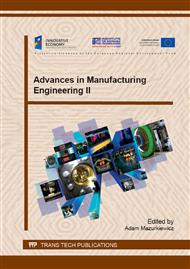p.257
p.263
p.271
p.278
p.283
p.289
p.295
p.301
p.307
A Pro-Ecological System for Using Industrial Oils and Cutting Fluids
Abstract:
The increase in pollution and contamination of the environment in recent years has resulted in the increase of interest in its protection. The basic premise of environmental policy, which is reflected in a number of legal acts, is carrying out activities aimed at minimizing the amount of produced waste [1-3]. In particular, this applies to waste that have harmful effects on the environment, and it includes the vast majority of industrial oils and technological, petroleum-based fluids (over 85%) [4]. One of the fundamental directions related to their use, in accordance with the standards of protection of the environment, is reducing the consumption by extending their functional life [5]. The maximum extension of the functional life for oils and fluids is the goal of the systemic approach to the problem of rational use, which includes the process of the monitoring of key functional properties and systematic, periodical treatment. The most beneficial are on-site treatment processes of oils and fluids conducted while maintaining the continuity of the technological processes. It is preferable to use mobile treatment devices, which provide the means to create a dispersed system in fluid treatment in successive machines and equipment [6-8].
Info:
Periodical:
Pages:
307-312
DOI:
Citation:
Online since:
August 2015
Authors:
Keywords:
Price:
Сopyright:
© 2015 Trans Tech Publications Ltd. All Rights Reserved
Share:
Citation:


